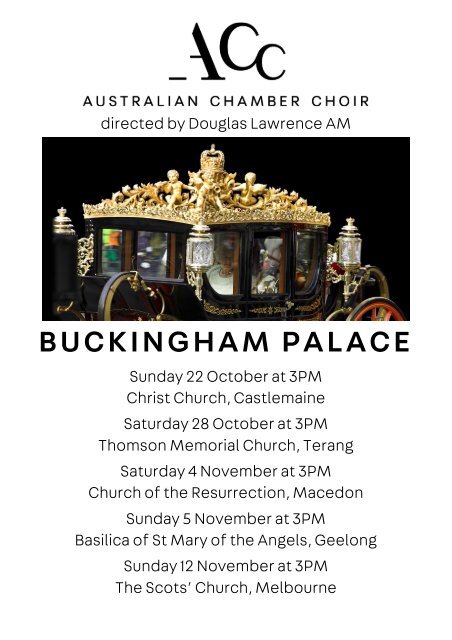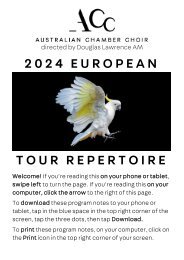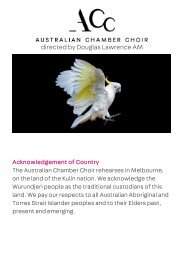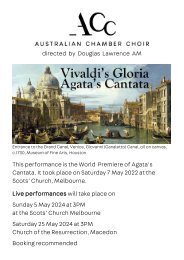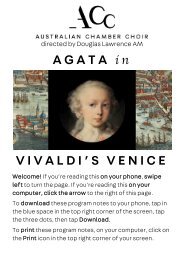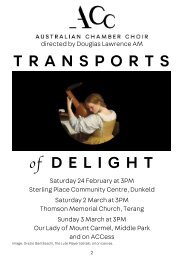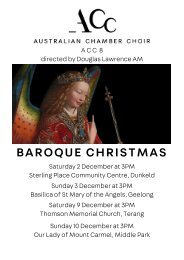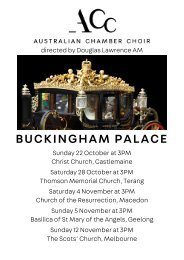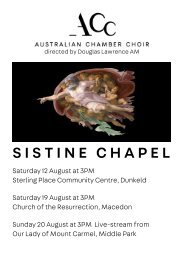Buckingham Palace Program
Detailed program notes, with artists' names, texts, translations, historical background and colour illustrations
Detailed program notes, with artists' names, texts, translations, historical background and colour illustrations
Create successful ePaper yourself
Turn your PDF publications into a flip-book with our unique Google optimized e-Paper software.
directed by Douglas Lawrence AM<br />
BUCKINGHAM PALACE<br />
Sunday 22 October at 3PM<br />
Christ Church, Castlemaine<br />
Saturday 28 October at 3PM<br />
Thomson Memorial Church, Terang<br />
Saturday 4 November at 3PM<br />
Church of the Resurrection, Macedon<br />
Sunday 5 November at 3PM<br />
Basilica of St Mary of the Angels, Geelong<br />
Sunday 12 November at 3PM<br />
The Scots’ Church, Melbourne
<strong>Buckingham</strong> <strong>Palace</strong> has been the main seat of the British<br />
monarchy since Queen Victoria took up residence there<br />
in 1837. Its royal residents, from the Houses of Windsor,<br />
Saxe-Coburg-Gotha and Hanover, like the Tudors and<br />
Stuarts before them, have been diligent patrons of music,<br />
and have drawn from composers much of their finest<br />
work. British royalty is unique in this century, in having<br />
been able to continue this tradition of patronage.<br />
Constitutional monarchy in Britain and the<br />
Commonwealth has not meant – as it now means in<br />
Scandinavia, the Benelux countries and Spain – a lack of<br />
pageantry. Even after two world wars, every London<br />
coronation and royal wedding incorporates rituals dating<br />
back to the Middle Ages: rituals that neither the rise of<br />
Protestantism nor the growing power of parliament has<br />
destroyed.<br />
William Byrd musically enriching Elizabeth I’s Anglican<br />
settlement while himself clinging to Catholicism; Henry<br />
Purcell serving Charles II, James II, William III and Mary II<br />
with an undisturbed conscience; Handel paying artistic<br />
tribute to Queen Anne, George I, and George II by turns;<br />
Sir Hubert Parry and Sir Charles Villiers Stanford inspired<br />
by Edward VII’s coronation; and so on until Judith Weir, in<br />
our own time, mourning Elizabeth II with verses from the<br />
Psalms: these achievements are proof that musical<br />
tradition is the trunk of a living tree that still puts forth<br />
shoots after hundreds of years. Far from cramping<br />
individual endeavours, it strengthens them.<br />
2
THE PROGRAM<br />
FROM THE VICTORIAN AND GEORGIAN ERAS<br />
Sir William McKie (1901–84)<br />
We wait for Thy loving kindness, O God (1947)<br />
Samuel Sebastian Wesley (1810–76)<br />
Thou wilt keep him in perfect peace<br />
Sir Charles Villiers Stanford (1852–1924)<br />
Coronation Gloria (1937)<br />
FROM THE REIGN OF ELIZABETH II<br />
Judith Weir CBE (born 1954) Like as the hart (2022)<br />
Sir John Tavener (1944–2013) Song for Athene (1993)<br />
Benjamin Britten, Baron Britten of Aldeburgh (1913–76)<br />
Jubilate Deo (1961)<br />
INSTRUMENTAL INTERLUDE<br />
Georg Frideric Handel (1685–1757) Air and Hornpipe from<br />
the Water Music (1717)<br />
FROM THE RENAISSANCE AND BAROQUE<br />
Attributed to John Redford (c.1500–45)<br />
Rejoice in the Lord alway<br />
Henry Purcell (1659–95)<br />
Thou knowest, Lord, the secrets of our hearts, Z58b (1672)<br />
William Byrd Gloria from the Mass for Four Voices<br />
3
TWO WORKS BY RALPH VAUGHAN WILLIAMS OM<br />
(1872–1958)<br />
4<br />
BROWSE CDs<br />
O taste and see (1953)<br />
Sanctus from the Communion Service in G Minor (1920/21)<br />
THE OLD HUNDREDTH, Melody attributed to Louis<br />
Bourgeois (c.1510–c.1560), arranged by Rhys Boak<br />
TWO WORKS BY SIR CHARLES HUBERT HASTINGS<br />
PARRY (1848–1918)<br />
My soul, there is a country (1916/18)<br />
I was glad (1902)<br />
The AUSTRALIAN<br />
CHAMBER CHOIR was<br />
established by Douglas Lawrence<br />
and Elizabeth Anderson in 2007.<br />
Between 2007 and 2019, the choir<br />
undertook seven concert tours of<br />
Europe, recorded five CDs and presented over 200<br />
concert performances, many of which were recorded for<br />
broadcast on ABC Classic FM or 3MBS FM.<br />
During and around the lockdowns of 2020 and ‘21, the<br />
ACC built a live-streaming platform, increased the<br />
number of programs presented per year, toured Victoria<br />
and released the CD, A Baroque Christmas. Click to<br />
browse the choir’s CDs.
International tours – travel with us!<br />
In 2015, returning by invitation to Denmark’s oldest<br />
classical music festival, the Sorø International, the ACC<br />
was made an Honorary Life Member and took its place<br />
alongside such luminaries as Wilhelm Kempff, Anton<br />
Heiller, Gaston Litaize and Julian Bream.<br />
You are invited to travel with us for 16 days from Bruges to<br />
Venice during our eighth concert tour of Europe. We are<br />
excited, as we haven‘t ventured overseas since 2019.<br />
We have return invitations to sing in the Cathedrals of<br />
Bonn and Berlin and to appear as special guests in the<br />
International Organ Festivals of Flanders and Darmstadt.<br />
Our Friends can enjoy three different concert programs,<br />
as well as meals and post-concert receptions with the<br />
choir. Our optional ‘Friends Choir’ sessions are a bonus<br />
for anyone who likes to sing, or even to listen up close. In<br />
Venice, the ACC teams up with the Conservatorium‘s<br />
period instrument orchestra to present a long-lost<br />
cantata, written by Agatha, an orphan from Vivaldi’s<br />
Ospedale della Pietà. This cantata, composed in Venice,<br />
was reconstructed and premiered in Melbourne in 2022.<br />
Be in the audience in the Venetian Baroque splendour of<br />
the Pisani <strong>Palace</strong> when it is heard here for the first time in<br />
three centuries, and celebrate with the choir and<br />
orchestra at the reception afterwards.<br />
5
MORE ABOUT THE 2024 TOUR<br />
The ACC at St Martin-in-the-Fields, July 2019. Image: Jessica Pigg<br />
The 2024 tour has all the usual ingredients: a good balance<br />
of organised sight-seeing and free time, a luxury coach,<br />
four-star accommodation and qualified tour guides to<br />
give us insights into the music, the art and the history.<br />
As always, the tour is managed and escorted by Eastern<br />
Hill Travel, who will be with us throughout the tour to look<br />
after every detail of the journey. Our tour operator<br />
partners of nine years at Pega DMC have thoroughly<br />
completed all the preparations on the ground in Belgium<br />
and Germany.<br />
A special ingredient in this itinerary is a four-night stay in<br />
the island city of Venice. For the Austrian and Italian part<br />
of our journey, we have teamed up with tour operators,<br />
Limelight Arts Travel, renowned for providing travellers<br />
with a rich and rewarding experience, especially in Venice.<br />
6
Thank you to<br />
our donors!<br />
DONATE NOW<br />
We are immensely grateful<br />
to our donors (listed on<br />
pages 32 to 35) for the<br />
important part that they<br />
continue to play in the<br />
success story that is the<br />
Australian Chamber Choir.<br />
Anish Nair and Isobel Todd. Image: Emma Phillips<br />
The ACC provides a rigorous training ground for young<br />
professional singers. Payment to all singers for their work<br />
as performing and recording artists working in Australia is<br />
an important affirmation of their standing as<br />
professionals.<br />
Income from the Support Fund is used to subsidise<br />
concerts for which income from ticket sales does not<br />
cover costs, such as for some regional concerts and for<br />
those which demand specialised resources for authentic<br />
performance. Income from the Support Fund is also used<br />
to commission new works, produce commercial<br />
recordings and videos, and to provide a financial base to<br />
support our singers for the long term.<br />
We would love to welcome you into our lively group of<br />
supporters, the lifeblood of our organisation.<br />
Make a tax-deductible donation now<br />
7
PROGRAM NOTES<br />
FROM THE VICTORIAN AND GEORGIAN ERAS<br />
Sir William McKie<br />
Born in Collingwood, Melbourne, 22 May 1901;<br />
died in Ottawa, Canada, 1 December 1984<br />
We wait for Thy loving kindness, O God (1947)<br />
Sir William McKie was the last person to hold the position<br />
of Melbourne City Organist. He left that post in 1938 and<br />
soon afterwards took up the role of Organist and Master<br />
of the Choristers at Westminster Abbey. He played a key<br />
role arranging and directing the music for the marriage of<br />
(then) Princess Elizabeth in 1947. Six years later, his<br />
involvement in the coronation of Queen Elizabeth II<br />
ensured his knighthood. We wait for Thy loving kindness,<br />
composed for the 1947 nuptials, has (unsurprisingly in the<br />
circumstances) marked echoes of Vaughan Williams in its<br />
style, with its parallel triads, its mediaeval atmosphere,<br />
and its climax’s unexpected vehemence. McKie, like his<br />
slightly older contemporary, the Presbyterian Sir Robert<br />
Menzies, belonged to a class of Australians - more<br />
common in his own day than in ours - for whom wholehearted<br />
antipodean allegiance and whole-hearted British<br />
allegiance coexisted without the smallest illogic or<br />
emotional discord. The title of McKie’s 1992 biography,<br />
by fellow Melburnian and fellow Anglican, Howard Hollis,<br />
is germane: The Best of Both Worlds.
MCKIE<br />
BROWSE 2024 INTERNATIONAL SEASON<br />
Solo We wait for Thy loving kindness, O God,<br />
In the midst of Thy temple.<br />
Choir Alleluia.<br />
O God, according to Thy name<br />
So is Thy praise unto the world's end.<br />
Thy right hand is full of righteousness.<br />
Alleluia.<br />
Solo We wait for Thy loving kindness, O God,<br />
In the midst of Thy temple.<br />
Choir O Lord, send us now prosperity.<br />
Solo Amen.<br />
Choir Amen.<br />
Samuel Sebastian Wesley<br />
Born in London, 14 August 1810;<br />
died in Gloucester, 19 April 1876<br />
Thou wilt keep him in perfect peace<br />
Combative, vitriolic, and supercilious, Samuel Sebastian<br />
Wesley inspired among most of his contemporaries the<br />
same sentiments which former British cabinet minister<br />
Ernest Bevin unforgettably voiced in the following<br />
century about his own Labour Party colleague, the<br />
habitually boorish Richard Crossman. On being told that<br />
Crossman was ‘his own worst enemy,’ Bevin retorted in<br />
his Somerset drawl: ‘Not while Ah’m alive, he ain’t.’<br />
Embittering Wesley above all were the circumstances of<br />
his birth: he was an illegitimate son of the eccentric<br />
composer Samuel Wesley, with everything that<br />
9
SS WESLEY BROWSE 2024 INTERNATIONAL SEASON<br />
illegitimacy meant at the time, in terms of social<br />
disrepute. By strength of will, combined with impressive<br />
creative as well as performing talent, Samuel Sebastian<br />
transcended the disadvantages of his circumstances to<br />
become one of his country’s most respected organists<br />
and a greatly skilled composer of sacred works, such as<br />
this one. Wesley had a knack for conceiving melodies that<br />
might look commonplace on paper but that haunt the<br />
mind for decades. The best-known instance of this knack<br />
is the hymn tune Aurelia, usually sung to words beginning<br />
The church’s one foundation.<br />
Thou wilt keep him in perfect peace, dating from around<br />
1850, is one of Wesley’s two or three most celebrated<br />
anthems. It has retained a firm place in the esteem of<br />
England’s cathedral choirs ever since Wesley’s own day<br />
and was performed at the Coronation of Elizabeth II. Its<br />
invocation of blessed repose – drawing on Isaiah, St<br />
Matthew’s Gospel, and St John’s Gospel as well as on the<br />
Psalms – bespeaks a sensitivity and unselfconscious<br />
piety in Wesley’s nature, beneath the quarrelsome<br />
exterior which he showed to the world.<br />
Thou wilt keep him in perfect peace,<br />
whose mind is stayed on Thee.<br />
The darkness is no darkness with thee,<br />
But the night is as clear as day:<br />
The darkness and the light are to Thee both alike.<br />
God is light, and in him is no darkness at all.<br />
O let my soul live, and it shall praise Thee.<br />
10
SS WESLEY BROWSE 2024 INTERNATIONAL SEASON<br />
For thine is the kingdom,<br />
The power and the glory, for evermore.<br />
Charles Villiers Stanford<br />
Born in Dublin, 30 September 1852;<br />
died in London, 29 March 1924.<br />
Coronation Gloria (1911)<br />
This work was commissioned for the coronation of<br />
George V and subsequently performed at the<br />
coronations of George VI and Elizabeth II.<br />
A passionate Anglophile monarchist who, nevertheless,<br />
would have been enraged if anyone queried his Irish<br />
patriotism, Stanford seems forever doomed to serve as a<br />
kind of historiographical double-act with Sir Hubert<br />
Parry. In similar fashion, lazy journalists used to blur the<br />
obvious distinctions between GK Chesterton and Hilaire<br />
Belloc by appropriating Bernard Shaw’s flippant coinage<br />
‘the Chesterbelloc’. Actually, Stanford and Parry – born<br />
four years apart – had an often discordant relationship:<br />
Parry quailing at Stanford’s ferocious temper, Stanford<br />
resenting Parry’s inherited wealth and left-wing<br />
sympathies, privately referring to Parry as ‘the plutocratic<br />
radical’. Earlier in their careers, though, they managed<br />
outward courtesies. Both were asked to write music for<br />
the coronations of Edward VII in 1902 and George V in 1911.<br />
Parry’s I was glad, the final piece on today’s program, is<br />
well remembered from these occasions; Stanford’s<br />
11
STANFORD BROWSE 2024 INTERNATIONAL SEASON<br />
contribution has scarcely been remembered at all. It<br />
shares with Parry’s work not mere grandeur of utterance<br />
but more specific traits, such as the B flat major key –<br />
particularly useful for trumpeters, since that key falls<br />
naturally in the instrument’s most eloquent register – and<br />
numerous detailed felicities of word-setting (such as the<br />
little flourish at We worship Thee) which give the lie to the<br />
once-widespread myth that no composer on English soil<br />
between Purcell and Britten could master English texts.<br />
Glory be to God on high and on earth peace,<br />
good will towards men.<br />
We praise Thee,<br />
we bless Thee,<br />
we worship Thee,<br />
we glorify Thee,<br />
We give thanks to Thee for Thy great glory,<br />
O Lord God, heavenly King,<br />
God the Father Almighty.<br />
O Lord, the only-begotten Son, Jesus Christ;<br />
O Lord God, Lamb of God,<br />
Son of the Father,<br />
That takest away the sins of the world,<br />
have mercy upon us.<br />
Thou that takest away the sins of the world,<br />
have mercy upon us.<br />
Thou that takest away the sins of the world,<br />
receive our prayer.<br />
12
FROM THE REIGN OF ELIZABETH II<br />
Judith Weir Born in Cambridge, 11 May, 1954<br />
Like as the hart (2022)<br />
When, in 2014, Judith Weir became the royal family’s court<br />
composer – the first woman ever to hold the post – she<br />
remained much less known to the general public than her<br />
three immediate predecessors in the role (Sir Arthur Bliss,<br />
Malcolm Williamson, and Sir Peter Maxwell Davies). But<br />
preceding her appointment, as is often the way behind<br />
what seems like an ‘overnight success’, had been many<br />
years of strenuous labour. This included her composition of<br />
half a dozen operas, which have been performed in<br />
continental Europe as well as in Britain, and which in several<br />
instances evoke the legends of Weir’s Scottish ancestors.<br />
Apart from her operas, Weir has probably become most<br />
famous for her choral works, including Like as the hart, first<br />
heard (and originally conceived) for the late queen’s<br />
funeral. Set to words which include some of the most griefstricken<br />
lines in the Old Testament, the anthem has a<br />
harmonic character rather more French than traditionally<br />
English. It was sung both at the funeral of HM Queen<br />
Elizabeth II and the coronation of HM King Charles III.<br />
Like as the hart desireth the water-brook: so<br />
longeth my soul after Thee, O God.<br />
My soul is athirst for God, yea, even for the living<br />
God: when shall I come to appear before the<br />
presence of God?<br />
13
WEIR<br />
BROWSE 2024 INTERNATIONAL SEASON<br />
My tears have been my meat day and night: while<br />
they daily say unto me, Where is now thy God?<br />
Now when I think thereupon, I pour out my heart by<br />
myself: for I went with the multitude, and<br />
brought them forth into the house of God;<br />
In the voice of praise and thanksgiving: among such<br />
as keep holy-day.<br />
Why art thou so full of heaviness, O my soul: and<br />
why art thou so disquieted within me?<br />
Put thy trust in God: for I will yet give Him thanks for<br />
the help of His countenance.<br />
Psalm 42: 1–7<br />
Sir John Tavener<br />
Born in London, 28 January 1944;<br />
died in Child Okeford, Dorset, 12 November 2013<br />
Song for Athene (1993)<br />
Knighted in 2000, and an Orthodox Church communicant<br />
from 1977 (he never apostatised from this allegiance,<br />
despite media comment to that effect), John Tavener<br />
was descended – spelling changes notwithstanding –<br />
from the sixteenth-century Taverner. He is best known<br />
for the religious themes that dominate his works. These<br />
works include an opera, Thérèse (dealing with the Lisieux<br />
saint’s life); The Protecting Veil, for cello and string<br />
orchestra; and the present a cappella motet, Song for<br />
Athene, famously performed at Princess Diana’s funeral<br />
in 1997, though it had been written four years earlier. The<br />
14
TAVENER BROWSE 2024 INTERNATIONAL SEASON<br />
‘Athene’ of the title is Athene Hariades – a friend of the<br />
composer and a teacher at London’s Hellenic College –<br />
who had perished in a road accident. Its lyrics were<br />
compiled at Tavener’s request (and at only twenty-four<br />
hours’ notice) by the septuagenarian Mother Thekla, née<br />
Marina Sharf, an Orthodox abbess based in Whitby,<br />
Yorkshire, who for decades served as Tavener’s spiritual<br />
mentor. With two exceptions, the passages chosen by<br />
Mother Thekla come from the Orthodox liturgy; the other<br />
passages (the first and fifth sections) are quotations<br />
from Act V and Act II, respectively, of Hamlet. The piece –<br />
with its characteristic drone in the bass lines throughout<br />
– was given renewed radio exposure in numerous<br />
countries during the days that followed Tavener’s death.<br />
Alleluia. May flights of angels sing thee to thy rest.<br />
Alleluia. Remember me, O Lord, when you come<br />
into your kingdom.<br />
Alleluia. Give rest, O Lord, to your handmaid, who<br />
has fallen asleep.<br />
Alleluia. The Choir of Saints have found the wellspring<br />
of life and door of Paradise.<br />
Alleluia. Life: a shadow and a dream.<br />
Alleluia. Weeping at the grave creates the song:<br />
Alleluia. Come, enjoy rewards and crowns I have<br />
prepared for you.<br />
15
Benjamin Britten, Baron Britten of Aldeburgh<br />
Born in Lowestoft, Suffolk, 22 November 1913;<br />
died in Aldeburgh, Suffolk, 4 December 1976<br />
Jubilate Deo<br />
Britten’s left-wing sentiments no more precluded a<br />
fondness for the House of Windsor than his religious<br />
heterodoxy precluded a fondness for Anglican ritual. So,<br />
when the Duke of Edinburgh asked him to write a piece<br />
for the use of the choristers at St George’s Chapel,<br />
Windsor, Britten obliged. Exactly when the Queen’s<br />
spouse made the request remains unclear; 1958 has been<br />
suggested. At any rate, Britten - who had already met the<br />
royal couple in connection with the 1953 première of his<br />
opera Gloriana - took his time over the result, which he<br />
finished only in 1961. Its words employ Psalm 100, in what<br />
then remained the standard Anglican translation found in<br />
the Book of Common Prayer. Like Britten’s much earlier<br />
Te Deum (1934), it inhabits the key of C major and calls for<br />
SATB choir plus organ; unlike the Te Deum, it takes no<br />
more than four minutes to perform. Perhaps its sheer<br />
brevity gave it a special appeal to His Royal Highness,<br />
whose own public modes of verbal expression inclined<br />
less to protracted orating than to such epigrams as ‘Pull<br />
your fingers out’ and ‘I would like to go to Russia very<br />
much although the bastards murdered half my family.’<br />
Certain it is that the royal patron insisted on having<br />
Britten’s piece revived for his eightieth birthday, and<br />
16
BRITTEN BROWSE 2024 INTERNATIONAL SEASON<br />
again for his ninetieth; he also directed in his will that it be<br />
included as part of his funeral ceremony.<br />
O be joyful in the Lord, all ye lands;<br />
Serve the Lord with gladness<br />
and come before his presence with a song.<br />
Be ye sure that the Lord he is God:<br />
It is he that hath made us and not we ourselves;<br />
We are his people, and the sheep of his pasture.<br />
O go your way into his gates with thanksgiving,<br />
And into his courts with praise.<br />
Be thankful unto him and speak good of his name.<br />
For the Lord is gracious, His mercy is everlasting;<br />
And his truth endureth from generation to<br />
generation. Amen.<br />
INSTRUMENTAL INTERLUDE<br />
George Frideric Handel<br />
Born in Halle, Germany, 23 February 1685;<br />
died in London, 14 April 1759<br />
Air and Hornpipe from the Water Music (1717)<br />
Mythology has arisen concerning the origin of Handel’s<br />
Water Music. It has often been alleged that Handel fell<br />
out of favour with King George I when he moved to<br />
England, leaving the future monarch (who was then<br />
Elector of Hanover) in Germany. The story goes that<br />
Handel won back George’s approval solely through the<br />
merits of his latest piece, first heard on a barge during a<br />
17
HANDEL BROWSE 2024 INTERNATIONAL SEASON<br />
1717 celebration on the River Thames. Actually, there<br />
exists no solid evidence of any sustained rancour<br />
between the king and the musician. Besides, some<br />
scholars ascribe the creation of the music itself to<br />
another royal celebration on the Thames, from two years<br />
later. During Handel’s own lifetime, the score never<br />
ranked among his most renowned works. It enjoyed much<br />
less fame than several of his oratorios and operas. Only in<br />
the late nineteenth century did it first become a great<br />
popular favourite, arranged for numerous different<br />
instrumental combinations. Today’s concert includes<br />
two particularly well-loved excerpts: the F major Air, with<br />
its main melody’s persistent dotted-quaver motif; and<br />
the D major Hornpipe, among the composer’s most<br />
exuberant, bracing inventions, marked by strenuous<br />
syncopated rhythms.<br />
FROM THE RENAISSANCE AND BAROQUE<br />
Attributed to John Redford<br />
Born c.1500, birthplace unknown;<br />
died in London, October or November 1547<br />
Rejoice in the Lord alway<br />
In sharp contrast to most sixteenth-century English<br />
music, which waited till the twentieth century to be<br />
rediscovered, this short anthem was known to historians<br />
since the 1770s. It came down to us through its inclusion<br />
in the Mulliner Book, a heterogeneous collection of<br />
18
Attr. REDFORD BROWSE 2024 INTERNATIONAL SEASON<br />
approximately one hundred compositions assembled for<br />
private use early in the reign of Elizabeth I by Thomas<br />
Mulliner, an Oxford organist. Sir John Hawkins, friend of<br />
Dr Johnson and author of A General History of the<br />
Science and Practice of Music, seems to have been the<br />
first person to ascribe Rejoice to John Redford, who<br />
certainly produced more pieces found in the Mulliner<br />
Book than any other figure. Redford, it is worth noting,<br />
had literary as well as musical gifts, being the author of a<br />
morality play, The Play of Wit and Science. The attribution<br />
of Rejoice to Redford has been disputed, mainly because<br />
Redford died two years before Edward VI’s Protestant<br />
government made compulsory the use of English for<br />
sacred choral works, and forbade composers to use<br />
more than one note of music per syllable. Still, it is<br />
entirely possible that clandestine syllabic vernacular<br />
settings had been conceived and circulated well before<br />
the 1549 Book of Common Prayer mandated them. The<br />
text comes from Philippians 4: 4–7, and much later Purcell<br />
would set a slightly different version of it (in which, for<br />
example, ‘softness’ becomes ‘moderation’ and ‘with<br />
giving of thanks’ becomes ‘with thanksgiving’).<br />
Rejoice in the Lord alway,<br />
and again I say, rejoice.<br />
Let your softness be known unto all men:<br />
the Lord is at hand.<br />
Be careful for nothing:<br />
but in all prayer and supplication,<br />
19
Attr. REDFORD BROWSE 2024 INTERNATIONAL SEASON<br />
let your petitions be manifest unto God with giving<br />
of thanks.<br />
And the peace of God,<br />
which passeth all understanding,<br />
shall keep your hearts and minds through Christ<br />
Jesu. Amen.<br />
Henry Purcell Born in London, 1659; died there in 1695<br />
Thou knowest, Lord, the secrets of our hearts, Z58b (1672)<br />
Henry Purcell was the organist at Westminster Abbey<br />
from 1679 until his death in 1695. The text of Thou<br />
knowest, Lord is from the Order of the Burial of the Dead,<br />
in the Book of Common Prayer, first published in 1549.<br />
These sentences are prescribed in the Order to be sung<br />
or said as the coffin is made ready for interment. In the<br />
State Funeral of Her Majesty, Queen Elizabeth II, they<br />
were sung as the coffin was borne into Westminster<br />
Cathedral. Purcell composed this setting (Z58b) in 1672,<br />
possibly to be sung at the funeral of fellow composer,<br />
Henry Cooke. The work was subsequently performed at<br />
the funerals of Queen Mary II, Queen Elizabeth I and<br />
Prince Philip. The manuscript, held in the British Library, is<br />
one of the earliest documents known to be in Purcell’s<br />
hand.<br />
© Elizabeth Anderson, 2022<br />
Thou knowest, Lord, the secrets of our hearts;<br />
Shut not thy merciful ears unto our pray'rs;<br />
But spare us, Lord most holy, O God most mighty.<br />
20
PURCELL BROWSE 2024 INTERNATIONAL SEASON<br />
O holy and most merciful Saviour, Thou most worthy<br />
Judge eternal, Suffer us not at our last hour.<br />
For any pains of death to fall away from Thee.<br />
Giovanni Antonio (Canaletto) Canal (1697–1768), The Interior of Henry VII’s<br />
Westminster Abbey (c.1730), oil on canvas, Museum of London<br />
21
William Byrd<br />
Born in Lincoln, 1543;<br />
died in Stondon Massey, England, 4 July 1623<br />
Gloria from the Mass for Four Voices (1592/93)<br />
Byrd was old enough — along with his still older friend<br />
Thomas Tallis — to have incurred the most searing blasts<br />
of English religious controversy. Born in Henry VIII’s reign,<br />
he was later a subject of the openly Protestant Edward<br />
VI, the no less openly anti-Protestant Mary I, and the<br />
compromising Anglicans Elizabeth I and James I.<br />
Privately, Byrd held fast to the Roman rite, with all the<br />
financial penalties and physical risks that this usually<br />
involved under Elizabeth and James, though he enriched<br />
Anglicanism’s repertoire also. His Mass for Four Voices<br />
seems to have been written in 1592 or 1593, before either<br />
his three-voice or his five- voice Mass settings. Like all of<br />
Byrd’s pieces meant for adherents of the old faith, this<br />
one would have been originally sung in secret by a small<br />
group of performers, and probably softly sung at that,<br />
since a forte rendition was simply asking for<br />
governmental informers to come and kick the door down.<br />
This work was sung in English at the Coronation of<br />
Elizabeth II and in the original Latin at the recent<br />
coronation of King Charles III.<br />
Gloria in excelsis Deo<br />
et in terra pax hominibus<br />
bonae voluntatis.<br />
Glory to God in the highest<br />
and on earth peace to<br />
people of good will.<br />
22
BYRD<br />
BROWSE 2024 INTERNATIONAL SEASON<br />
Laudamus te, benedicimus We praise You, we bless<br />
te, adoramus te,<br />
You, we adore You,<br />
glorificamus te,<br />
we glorify You,<br />
gratias agimus tibi propter we give You thanks<br />
magnam gloriam tuam, for Your great glory,<br />
Domine Deus,<br />
Lord God,<br />
Rex caelestis,<br />
heavenly King,<br />
Deus Pater omnipotens. O God Almighty Father.<br />
Domine Fili unigenite, Jesu Lord Jesus Christ, only<br />
Christe, Domine Deus, begotten Son, Lord God,<br />
Agnus Dei,<br />
Lamb of God,<br />
Filius Patris, qui tollis<br />
Son of the Father, You take<br />
peccata mundi,<br />
away the sins of the world,<br />
miserere nobis; qui tollis have mercy on us; You take<br />
peccata mundi,<br />
away the sins of the world,<br />
suscipe deprecationem receive our prayer;<br />
nostram.<br />
Qui sedes ad dexteram You are seated at the right<br />
Patris,<br />
hand of the Father,<br />
miserere nobis.<br />
have mercy on us.<br />
Quoniam tu solus<br />
For You alone are the Holy<br />
Sanctus, tu solus<br />
One, You alone are the<br />
Dominus, tu solus<br />
Lord, You alone are the<br />
Altissimus, Jesu Christe, Most High, Jesus Christ,<br />
cum Sancto Spiritu: in with the Holy Spirit, in the<br />
gloria Dei Patris.<br />
glory of God the Father.<br />
Amen.<br />
Amen.<br />
23
TWO WORKS BY RALPH VAUGHAN WILLIAMS OM<br />
Born in Down Ampney, 12 October 1872;<br />
died in London, 26 August 1958<br />
O taste and see (1953)<br />
Sanctus from the Communion Service in G Minor (1920/21)<br />
<br />
These works were both heard during the coronation<br />
service for HM Queen Elizabeth II, and O taste and see<br />
was repeated at her funeral.<br />
This work demonstrates that RVW could manage intimate<br />
choral meditations quite as well as The Old Hundredth’s<br />
big dramatic gestures. The introduction is the only time in<br />
the piece where the organ can be heard. Thereafter the<br />
choir performs a cappella, the concluding employment<br />
of parallel octaves between sopranos and basses being<br />
an unmistakable sign of Vaughan Williams’s authorship,<br />
echoing as it does similar passages in his Mass in G Minor.<br />
O taste and see how gracious the Lord is:<br />
Blessed is the man that trusteth in Him. Psalm 34:8<br />
The Mass in G Minor was composed during 1922 at the<br />
urging of Sir Richard Runciman Terry, choirmaster of<br />
Westminster Cathedral. Around 1900, Terry and his<br />
Westminster singers had begun systematically<br />
resuscitating the sixteenth-century sacred repertoire,<br />
then largely unknown in England. Byrd, Tallis, Palestrina,<br />
Lassus, Victoria, John Taverner, Christopher Tye: these<br />
were among the composers whom Terry revived.
VAUGHAN WILLIAMS BROWSE MORE CONCERTS<br />
Vaughan Williams’s music reflects their influence, but is<br />
by no means a mere imitation of them. It employs, for<br />
instance, repeated consecutive fifths which they would<br />
never have countenanced. Terry gave the work’s first<br />
liturgical performance, but it had actually been heard<br />
earlier (December 1922) in a secular context: Birmingham<br />
Town Hall. Thanking the composer for his achievement,<br />
Terry said: ‘I’m quite sincere when I say that it is the work<br />
one has all along been waiting for. In your individual and<br />
modern idiom you have really captured the old liturgical<br />
spirit and atmosphere.’<br />
Sanctus, Sanctus, Sanctus,<br />
Dominus Deus Sabaoth,<br />
Pleni sunt caeli et terra<br />
gloria tua.<br />
Hosanna in excelsis.<br />
Benedictus qui venit in<br />
nomine Domini.<br />
Hosanna in excelsis.<br />
Holy, Holy, Holy,<br />
Lord God of Hosts,<br />
Heaven and earth are full<br />
of Thy glory.<br />
Hosanna in the highest.<br />
Blessed is he who comes<br />
in the name of the Lord.<br />
Hosanna in the highest.<br />
THE OLD HUNDREDTH<br />
Melody attributed to Louis Bourgeois (c.1510–c.1560),<br />
arranged Rhys Boak<br />
Ralph Vaughan Williams was commissioned to arrange<br />
this sixteenth-century Genevan metrical psalm tune for<br />
the coronation of Queen Elizabeth II. It was sung by the<br />
choir and congregation as a hymn, both at the coronation<br />
and at the service marking its 50th anniversary.<br />
25
BOAK<br />
BROWSE 2024 INTERNATIONAL SEASON<br />
Rhys Boak, the organist for today’s program, is<br />
responsible for this setting, along with the other brass<br />
accompaniments performed today. Born in Melbourne,<br />
he studied with John Mallinson and Douglas Lawrence<br />
and was the organist of Douglas’s Choir of Ormond<br />
College from 1998 to 2006. One of Australia’s busiest<br />
organists, he performs here and internationally and has<br />
released a number of recordings. His orchestrations and<br />
arrangements can be heard on the Sony, Decca and Move<br />
labels in performances by, among others, the English<br />
Chamber Orchestra and Sir Richard Bonynge.<br />
© Elizabeth Anderson, 2023<br />
All people that on earth do dwell,<br />
Sing to the Lord with cheerful voice.<br />
Him serve with fear, His praise forth tell;<br />
Come ye before Him and rejoice.<br />
The Lord, ye know, is God indeed;<br />
Without our aid He did us make;<br />
We are His folk, He doth us feed,<br />
And for His sheep He doth us take.<br />
O enter then His gates with praise;<br />
Approach with joy His courts unto;<br />
Praise, laud, and bless His Name always,<br />
For it is seemly so to do.<br />
26
BOAK<br />
BROWSE 2024 INTERNATIONAL SEASON<br />
For why? the Lord our God is good;<br />
His mercy is for ever sure;<br />
His truth at all times firmly stood,<br />
And shall from age to age endure.<br />
To Father, Son and Holy Ghost,<br />
The God Whom Heaven and earth adore,<br />
From men and from the angel host<br />
Be praise and glory evermore. Amen.<br />
TWO WORKS BY SIR CHARLES HUBERT HASTINGS<br />
PARRY<br />
Born in Bournemouth, 27 February 1848;<br />
died in Rustington, England, 7 October 1918<br />
My soul, there is a country (1916/18)<br />
I was glad (1902), arranged by Rhys Boak<br />
Few indeed are the pieces in the vast corpus of Charles<br />
Hubert Hastings Parry which have enjoyed such great<br />
public appeal: the beloved, heaven-storming Jerusalem,<br />
of course; Blest Pair of Sirens, where Parry achieved the<br />
almost impossible by doing choral justice to words by<br />
Milton (a poet so rich in ‘verbal music’ – Bernard Shaw’s<br />
phrase about Shakespeare – as to defeat lesser<br />
composers); and the anthem I was glad. At Edward VII’s<br />
coronation it proved to be so popular among musicians<br />
and listeners alike that all four British coronations since<br />
then – 1911, 1937, 1953 and 2023 – have included it. So did<br />
27
PARRY<br />
BROWSE 2024 INTERNATIONAL SEASON<br />
the weddings in 1981 of Prince Charles to Lady Diana<br />
Spencer and in 2011 of Prince William and Kate Middleton.<br />
British musicologist Keith Anderson supplies the<br />
following summary of the work, which uses words from<br />
Psalm 122:<br />
The work starts with an introduction, originally<br />
entrusted to the large orchestra employed for the<br />
occasion, leading to the entry of the six-part choir<br />
with the opening words. In the original coronation<br />
version fanfares led to cries of Vivat from the King’s<br />
Scholars of Westminster School ... with a shift of key<br />
and mood for the semi-chorus O pray for the peace<br />
of Jerusalem, before the march rhythm resumes and<br />
the full choir sings ‘Peace be within Thy walls and<br />
plenteousness within Thy palaces.’<br />
Audiences might well find it hard to believe that the same<br />
musical mind which conceived the swashbuckling pomp<br />
of I was glad could also have created My soul, there is a<br />
country; but so it did. Whereas I was glad epitomises the<br />
public Parry - Parry the Composer Laureate, if you will -<br />
My soul shines a light on the private Parry, much<br />
influenced by metaphysics (above all German), at times<br />
racked by self-doubt, and in his later years, no longer<br />
able to subscribe to the straightforward Anglicanism of<br />
his upbringing, yet still very much longing to believe. My<br />
soul is the first in the published sequence for his six<br />
Songs of Farewell (1914-1915). It employs words by the<br />
seventeenth-century poet Henry Vaughan. Parry’s<br />
28
PARRY<br />
BROWSE 2024 INTERNATIONAL SEASON<br />
biographer Jeremy Dibble calls it ‘superbly constructed,<br />
metrically flexible and motivically concentrated.’<br />
Variations of mood follow in quick succession,<br />
intensified by the symbolic representation and contrast<br />
of yearning (in 3/4 time) and peace (in 6/8). But perhaps<br />
most memorable is the tonally oblique opening<br />
statement which is characterised by its two-chord<br />
phrases and rising intervals in the soprano part.’<br />
My soul, there is a country,<br />
Far beyond the stars,<br />
Where stands a wingèd sentry,<br />
All skillful in the wars.<br />
There, above noise and danger,<br />
Sweet Peace sits crowned with smiles,<br />
And One born in a manger<br />
Commands the beauteous files.<br />
He is thy gracious Friend<br />
And (O my soul, awake!)<br />
Did in pure love descend,<br />
To die here for thy sake.<br />
If thou canst get but thither,<br />
There grows the flower of peace,<br />
The rose that cannot wither,<br />
Thy fortress, and thy ease.<br />
Leave, then, thy foolish ranges;<br />
For none can thee secure<br />
But One, who never changes,<br />
Thy God, thy life, thy cure.<br />
29
PARRY<br />
BROWSE 2024 INTERNATIONAL SEASON<br />
I was glad when they said unto me:<br />
We will go into the house of the Lord.<br />
Our feet shall stand in thy gates: O Jerusalem.<br />
Jerusalem is built as a city: that is at unity in itself.<br />
For thither the tribes go up,<br />
even the tribes of the Lord : to testify unto Israel,<br />
to give thanks unto the Name of the Lord.<br />
For there is the seat of judgement:<br />
even the seat of the house of David.<br />
Vivat Regina! Vivat Regina! Vivat Regina Camilla!<br />
Vivat Rex! Vivat Rex! Vivat Rex Carolus!<br />
O pray for the peace of Jerusalem :<br />
they shall prosper that love thee.<br />
Peace be within thy walls:<br />
and plenteousness within thy palaces.<br />
For my brethren and companions' sakes:<br />
I will wish thee prosperity.<br />
Yea, because of the house of the Lord our God:<br />
I will seek to do thee good.<br />
<strong>Program</strong> notes © RJ Stove, 2014, 2015, 2017, 2023,<br />
except where otherwise stated<br />
30<br />
Today’s program is made<br />
possible by the generous<br />
assistance of the<br />
Robert Salzer Foundation
You have been listening to<br />
SOPRANO<br />
Victoria Brown<br />
Cornelia Elmelid<br />
Alex Hedt or Sarah Amos<br />
(Castlemaine, Macedon)<br />
Kristina Lang<br />
Katherine Lieschke<br />
Kate McBride*<br />
ALTO<br />
Elizabeth Anderson<br />
Melissa Lee<br />
Isobel Todd<br />
Sophie Whitehead<br />
ORGAN<br />
Rhys Boak<br />
TRUMPET<br />
David Farrands<br />
Anthony Frantz<br />
HORN<br />
Tom Campbell<br />
TENOR<br />
Matthew Bennett*<br />
Will Carr<br />
Joshua Lucena<br />
Sam Rowe* or Linton Roe<br />
(Castlemaine)<br />
BASS<br />
Thomas Drent<br />
Kieran Macfarlane<br />
Tom Reid<br />
Lucas Wilson-Richter<br />
TROMBONE<br />
Chris Farrands<br />
BASS TROMBONE<br />
Lucas Clayton<br />
TIMPANI<br />
Timothy Phillips<br />
* Denotes soloist<br />
31
SUPPORTERS<br />
We would like to thank all our donors, including those who wish to remain anonymous.<br />
BEQUESTS<br />
Maggie Flood<br />
Rosemary Gleeson<br />
Margaret Lawrence<br />
Lorraine Meldrum<br />
MAJOR DONORS<br />
The late Rosemary Gleeson<br />
Dr Merrilyn Murnane AM<br />
and the late<br />
Rev Max Griffiths MBE<br />
Dr Jan Schapper and<br />
Dr Mark Schapper<br />
DONORS<br />
$20,000+<br />
Robin Batterham<br />
Mary-Jane Gething<br />
The late Bob<br />
Henderson<br />
Peter Kingsbury<br />
Alana Mitchell<br />
Allan and Maria Myers<br />
$10,000+<br />
The late Iris and Warren<br />
Anderson<br />
Pat and Derek Duke<br />
Michael Elligate<br />
John Griffiths and<br />
Berni Moreno<br />
The late Thorry<br />
Gunnersen<br />
Caroline Lawrence<br />
The late Lorraine<br />
Meldrum<br />
Ian Phillips<br />
$5,000+<br />
James and Barbara<br />
Barber<br />
John and Fiona Blanch<br />
Sally Brown<br />
Jason Catlett<br />
Robert Dempster and<br />
Robin Bell<br />
Stuart and Sue<br />
Hamilton<br />
Arwen Hur<br />
The late Hector<br />
Maclean<br />
Cheryl and John Iser<br />
Alma Ryrie-Jones<br />
Cathy Scott<br />
Elizabeth and Andrew<br />
Turner<br />
Harry Williams<br />
$3,000+<br />
Hellen Fersch and the<br />
late Rowan McIndoe<br />
Bruce Fethers and<br />
Jennifer Smith<br />
Barry and Nola Firth<br />
Alan Gunther<br />
Richard Hoy<br />
Barbara Kristof<br />
Dorothy Low<br />
Sarah and Peter Martin<br />
The late Philippa and<br />
Alf Miller<br />
Anna Price<br />
Geoff and Angela<br />
Scollary<br />
Clare Scott<br />
Pamela Wilson<br />
32<br />
$1,000+<br />
Corry and Keith Adams<br />
Rae Anstee<br />
Mary and John Barlow<br />
Elizabeth Burns<br />
Margaret Callinan<br />
Tony and Madge<br />
Correll<br />
Maggie Flood<br />
Dianne Gome<br />
Heather and Ian Gunn<br />
Jeff Haines<br />
Bernice Hand<br />
Litha Heshusius<br />
Ferdi Hillen<br />
Doug Hooley<br />
Anthea Hyslop<br />
Huw Jones<br />
Jerry Koliha and<br />
Marlene Krelle<br />
George and Anne<br />
Littlewood<br />
Helen Lyth<br />
The late Mary<br />
McGivern-Shaw<br />
Gwen McIntosh<br />
Kate Michael and the<br />
late Barry Michael<br />
Leonie Millard and<br />
Matthew Pryor<br />
Rod Mummery<br />
The late Elisabeth<br />
Murdoch
James and June<br />
Nagorcka<br />
Ross Nankivell<br />
Susan and Richard<br />
Nelson<br />
Henk Nieuwenhuizen<br />
Paul and Sue Nisselle<br />
Ron Ogden<br />
Joan Roberts<br />
Noeline Sandblom<br />
Stephen Shanasy<br />
David and Lorelle<br />
Skewes<br />
Sandra Speirs<br />
Nicole Spicer<br />
Eve Steel<br />
Brian Swinn<br />
Pauline Tointon<br />
Chris and Roslyn White<br />
Glen Witham<br />
Robert and Helen<br />
Wright<br />
$200+<br />
Judith Antcliff<br />
Malcolm Baxter<br />
Rita Bagossy<br />
Helen Begley<br />
Jennifer Bellsham-<br />
Revell<br />
Jane Bland<br />
David Bond<br />
Barbara Braistead<br />
Margaret Breidahl<br />
Douglas Bristow<br />
Mary-AnnBrown<br />
Bill Burdett<br />
Kenneth Cahill<br />
Nicholas and Debbie<br />
Carr<br />
Joy Carver<br />
Brian and Lucy<br />
Chapman<br />
Catherine Clancy<br />
June Cohen<br />
Greg Coldicutt<br />
Julie Copeland<br />
Michael Dolan<br />
John Eager<br />
Michael Edgeloe<br />
John Edmonds<br />
Tom and Kate Eggers<br />
Amber Ellis<br />
John and Margaret<br />
Emery<br />
Patricia Fanning<br />
Rosemary Fethers<br />
Anne Gilby<br />
Craig Gliddon<br />
Lois Goodin<br />
Stephen Gray<br />
Clare Green<br />
Robert and Susan<br />
Gribben<br />
Robin Haines<br />
Carol Harper<br />
Christine Haslam<br />
Tom Healey and<br />
Helen Seymour<br />
Jane Hockin<br />
Geoffrey Hogbin<br />
Andrew Holmes<br />
Geoff Hone<br />
Lyn Howden and<br />
David Beauchamp<br />
Annemarie Hunt<br />
Priscilla Jamieson<br />
Chris Jessup<br />
Barry Jones and<br />
Rachel Fagetter<br />
Helen Jordan<br />
InfoPlus<br />
Deborah Kayser and<br />
Nic Tsiavos<br />
Trevor Kingsbury<br />
Louise Kornman<br />
33<br />
Alan and Beverley<br />
Larwill<br />
Graham and Marian<br />
Lieschke<br />
Pamela Lloyd<br />
Dawn and Peter Lord<br />
The late Heather Low<br />
Cathy Lowy<br />
Sue Lyons<br />
Bradley Maclarn<br />
Penelope Maddick<br />
Anne Makepeace<br />
Chris Maxwell<br />
Campbell and Noreen<br />
McAdam<br />
Clare McArdle<br />
Fiona McCook<br />
Mark McDonald<br />
Noel and Donna<br />
McIntosh<br />
Lyn McKenzie<br />
Hilary McPhee<br />
Sue Millar and Arie<br />
Baelde<br />
Niq Morcos and<br />
Morgaine Williams<br />
Evelyn Mortimer<br />
Mary Muirhead and<br />
Tom Gleisner<br />
Joy Murray<br />
Sheila Nash<br />
Christine Newman<br />
Magaret Newman<br />
Stephen Newton<br />
The late Julianna<br />
O’Bryan<br />
Ross Philpott<br />
Yoko Pinkerton<br />
Nancy Price<br />
Paul and Mary Reid<br />
Ian and the late Di<br />
Renard<br />
Dianne Richter<br />
Angela and Paul Riggs
Annette and David<br />
Robinson<br />
John and Cynthia Rowe<br />
Muharrem Sari<br />
Hans Schroeder<br />
Elaine Smith<br />
Lindsay Smyth<br />
Lenore Stephens<br />
Eric Stokes<br />
Rob Stove<br />
Rosalie Strother<br />
Marion Taubman and<br />
Harvey Jacka<br />
Ross Telfer<br />
Roger Thompson<br />
Mark Tweg<br />
Dennis Ward<br />
Mel Waters<br />
Charles and Carolyn<br />
Williams<br />
D’Arcy Wood<br />
Margot Woods<br />
Jenny York<br />
Wallace Young<br />
The late Jennifer Young<br />
Margaret and Paul<br />
Zammit<br />
$100+<br />
Meghan Anders<br />
Bob Appleyard<br />
Christine Ashley<br />
Vicki and Peter<br />
Balabanski<br />
Helen and Brian<br />
Bayston<br />
Elizabeth Bennetto<br />
Louise Blatchford<br />
Patricia Brincat<br />
Mark Brolly<br />
Isobel Brown<br />
Jennifer Butler<br />
Geoffrey Cain<br />
Debbie Carr<br />
Maggie Cash<br />
Paul Chadwick<br />
Joelle Champert<br />
Gary Clark<br />
Lois Cooke<br />
Judith Couch<br />
Jane Court<br />
John De Luca<br />
Christian Doerig<br />
Mary Duckworth<br />
James Dunbar<br />
Rod Edwards<br />
Catherine Francis and<br />
Alan Todd<br />
Pamela Furnell<br />
Roger and Gillian<br />
Gamble<br />
Marina Garlick<br />
Claire and Sam Gatto<br />
Sylvia Geddes<br />
Joel Gladman<br />
Marged Goode<br />
Fiona Graham<br />
Susan Grant<br />
Jean Hadges<br />
Jennifer Hardy<br />
Lorna Henry<br />
Miranda Hoffman<br />
Carole Hynes<br />
Margaret Irving<br />
Rhonda Irving<br />
Malcolm Johns<br />
Barbara Johnson<br />
David Jones and Anne<br />
McKinley<br />
Garry Joslin<br />
Marie Joyce<br />
Vicky Karitinos<br />
Berenice Kavanagh<br />
Murray Kellam<br />
Gordon Kerry<br />
Barry and Judith<br />
Kilmartin<br />
Hans Kuhn<br />
34<br />
The late Elizabeth<br />
Lewis<br />
Noeline and Ken Linard<br />
Bruce Livett<br />
John Lorkin<br />
Heather and Donald<br />
Mansell<br />
Ethne Marshall<br />
Keith Mason<br />
Heather Mathew<br />
Rick McLean<br />
Ann McNair<br />
Diana Melleuish<br />
Rosemary and Bruce<br />
Morey<br />
Jane Morris<br />
Jill Ness<br />
Mark and Margaret<br />
Norton<br />
Betty and Peter O'Brien<br />
Mary O’Connor<br />
Cynthia O'Keefe<br />
Margaret Pagone<br />
Murray Paterson<br />
Michele Paul<br />
Andy Payne<br />
Marg Pearson<br />
William and Jenny<br />
Raper<br />
Michele Reid<br />
Rosalie Richards<br />
John and Carol Ride<br />
John and Naomi Rivers<br />
Janet Saker<br />
Terry Sheahan<br />
Lynne Star<br />
Geoffrey Steventon<br />
Robin Stretch<br />
Margaret Swann<br />
Jaga Szczepanik<br />
Nicholas Thomas<br />
Simon and Lynne<br />
Thornton<br />
Karin Tiedemann
Beau Tin<br />
Ian and the late Mary<br />
Traill-Sutherland<br />
Myrna Trute<br />
David Tuke<br />
Annie Turner<br />
Christine and David<br />
Volk<br />
Doug and Rosalie<br />
Walter<br />
Richard Wardman<br />
Patricia Wilkinson<br />
Marian Worcester<br />
Wendy Wright<br />
Peter Zegenhagen<br />
Other Donors<br />
21/04/2022 to<br />
6/10/2023<br />
Margaret Ames<br />
Sharyn Anderson<br />
Helen Annett<br />
Hagai Avisar<br />
George Philip Bade<br />
Joanna Baevski<br />
Kaylene Baird<br />
Jennifer Barke<br />
Heather Bell<br />
Patricia Bish<br />
Fiona Bozic<br />
Emily Brennan<br />
Jane Campbell<br />
Joan Canning<br />
David Cheal<br />
Angela Chynoweth<br />
Wendy Clayton<br />
Carmel Cleal<br />
Rosemary Cotter<br />
James Cousland<br />
Mimi Crockford<br />
Winonah Cunningham<br />
Sue Cutler<br />
Hannah Dart<br />
Noel Denton<br />
Robert Di Renzo<br />
Lorelei Drake<br />
Lesley Feddersen<br />
Colin Fiford<br />
Peter Flinn<br />
Anne and George<br />
Fyfield<br />
Georgina Genee<br />
Kirsten Glenwright<br />
Lyn Godwin<br />
Margaret Graham<br />
Kate Greene<br />
Maria Hansen<br />
Howard Harper<br />
Elizabeth Hickey<br />
Brier Johnson<br />
Margaret Jones<br />
Julie Kemelfield<br />
John Kenagy<br />
Susan Kuter<br />
Meredith Lawrence<br />
Susan and Michel<br />
Lawrence<br />
Ellen Liddell<br />
Gabrielle Lori<br />
Jane Macaulay<br />
John MacInnes<br />
Belinda Mackie<br />
John Margetts<br />
Christopher Marks<br />
Roland Maxwell<br />
Andrea McAdam<br />
Paul McCulloch<br />
Andrew and Caroline<br />
McDowall<br />
Gordon McGregor<br />
Lyndall McNally<br />
Amanda Mitchell<br />
Pam Moran<br />
Cara Morrissey<br />
Gae Mulvogue<br />
Ronni Murphy<br />
Joan Myers-Braun<br />
Diana Newport<br />
35<br />
Craig Oliver<br />
Keith Oliver<br />
Igor Orlic<br />
Suzanne Padgett<br />
Jan Palethorpe<br />
Jason Peart<br />
Kerry Pope<br />
Margaret Potts<br />
Chris Poynter<br />
Lyn Radley<br />
Jan and John Reynolds<br />
Karen Richardson<br />
John Rickard<br />
Rosemary Robertson<br />
Dora and Richard<br />
Rochford<br />
Pamela Rosso<br />
Ardyth Ruth<br />
Genevieve Ryan<br />
Jane Sandow<br />
Peter and Denise<br />
Saville<br />
Elizabeth Scott<br />
Peta and Charles<br />
Sherlock<br />
Carol Smitheringale<br />
Anne Snowdon<br />
Ann Sprague<br />
Lisa Stafford<br />
Gillian Swan<br />
Richard Symon<br />
Catherine Teague<br />
Gillian Trahair<br />
Maureen Urch<br />
Helen Vines<br />
Julia Walters<br />
Bruce Watson<br />
John Waugh-Young<br />
Patricia White<br />
Robert White<br />
Nicola Williams<br />
Sharon Young


